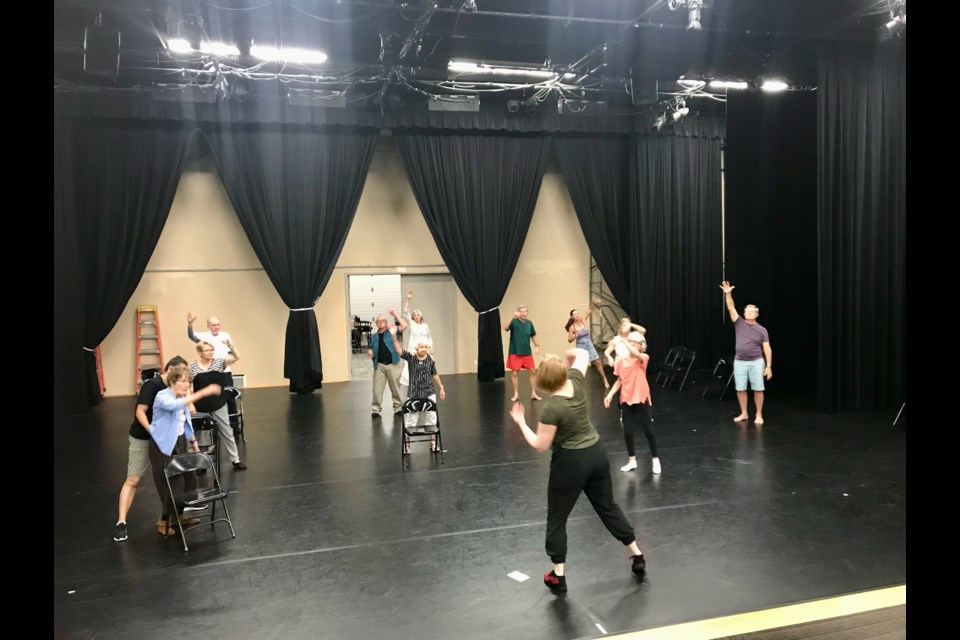Soon after he was diagnosed with Parkinson’s disease, someone recommended that Ketul Arnold try out a free dance class geared toward people like him.
He was hesitant and put off going for weeks. At the time, Arnold had pronounced tremors and a significant loss of balance due to his disease, so he was shy about moving in front of other people.
“It was challenging in the beginning, but it was a good challenging,” Arnold recalled. “The attitude in the class is that you cannot do anything wrong. However you move is the right way to move. That speaks to me because each of us was moving to whatever capacity we might be able, and we were all comfortable with one another in that process.”
That’s the attitude at 3rd Law’s Dance for Parkinson’s program, which offers free in person and online classes for people with Parkinson’s and other mobility challenges. Lisa Johnston, director of the program and an instructor, explained that the gentle movement classes are taught by dance professionals, but no experience is necessary to try it out.
“I would say it’s the opposite of physical therapy,” she said. “We’re all trained in working with people with Parkinson’s, so we have that background, but we focus on imagery and balance and sequencing and choreography and rhythm.”
The classes are in person every Tuesday at the Dairy Art Center in Boulder and four days a week online, including a Spanish class. The Longmont Senior Center will also be hosting bilingual classes as part of their fall offerings.
The first half of the dance class is done seated, before transitioning to a standing lesson. However, a teaching assistant stays seated to provide a modified demonstration of the standing movements for those who prefer to do the whole class sitting down.
While the classes have a structure, teachers use their professional dance backgrounds to customize the experience, so one might be influenced by ballet or Spanish dance forms. There’s also a collaborative aspect with the participants able to contribute to the choreography.
“There’s a sense of building up a positive self image with an attitude of possibility rather than limitation,” Johnston said.
Arnold, now 73, continues to regularly attend the free classes. His tremors have diminished to the point where they’re only noticeable when he’s under extreme stress and his balance has improved enough that he walks a mile and a half every morning with a friend, something he attributes to the dance class and a gentle yoga practice he regularly attends.
The Parkinson’s Foundation said that physical therapy and regular exercise may help improve or hold the symptoms of Parkinson’s at bay. More than a dozen studies have found that regular dance classes can improve balance, motor skills, freedom of movement and endurance, according to an article in Stanford Medicine.
Johnston has seen people transform over the course of a dance class, where participants sometimes start out hunched over, stiff and slow moving and end the class dancing full out or even forgetting their walker when they leave.
“There’s something where the music bypasses parts of your brain,” she said. “Where you might be very stiff in daily life, when music’s on a different part of the body kicks in and the brain kicks in.”
Beyond the physical improvements, the dance classes also create a sense of community and belonging for people who often feel isolated by their disease or mobility issues.
“I think in the Parkinson’s community there’s a sense of people saying, ‘Well, I don’t feel seen anymore,’” Johnston said. “Here, we see everybody. We celebrate everybody.”
Arnold said participants care about each other and keep touch in between classes. One friend he made in the class was also a fan of opera, so they would often go to the movie theater to watch the live broadcast of the Metropolitan Opera together.
He said community, combined with the instructors that he admires and trusts deeply, has made the dance classes a pillar in his life.
“All of us, you know, we have good days and bad days,” Arnold said. “When we come to the class, there’s no expectation that you’re to show up in any certain way. That’s a great relief because so much of our lives, we are expected to show up in certain ways. There’s just no judgment and that enables all of us to experience relaxation in a way that’s uncommon. Their freedom from judgment — gosh, what a joy that is.”
Dance for Parkinson’s also started an online introductory class for people interested in learning about the format, which takes place on the first Thursday of each month. Learn more and sign up for the classes at 3rdlaw.org/dance-for-parkinson/.
Registration for the Longmont classes opens up Aug. 15 through Longmont Senior Services and will be 12:30-1:30 p.m. on Thursdays from Sept. 1-Nov. 17 in person.



